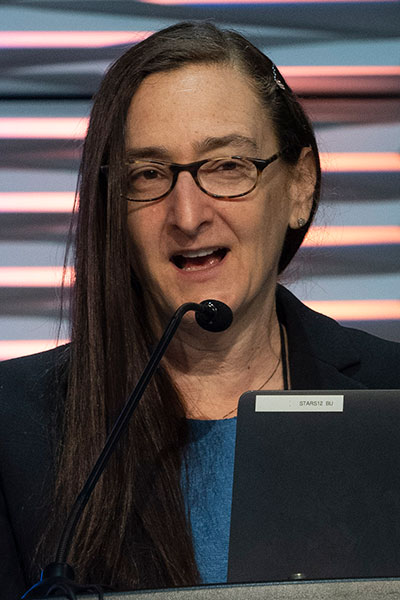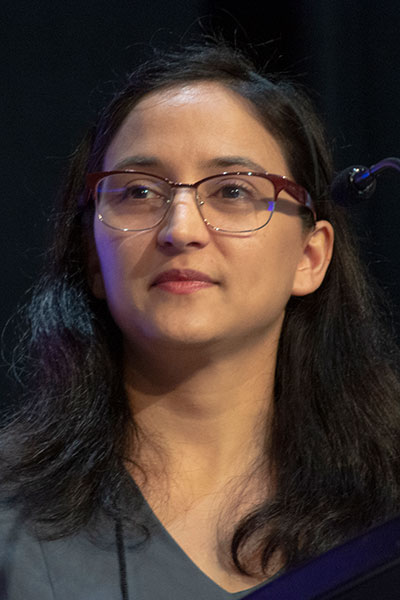
The San Antonio Breast Cancer Symposium set the stage for clinical research on Tuesday morning with presentations on a mix of anticipated topics in the Clinical Research Workshop.
Melinda Telli, MD, Associate Professor of Medical Oncology, Stanford University School of Medicine, opened the workshop by addressing the use of the postneoadjuvant setting to accelerate drug development.
Dr. Telli discussed opportunities to study circulating tumor DNA (ctDNA) across the cancer continuum. Detectable ctDNA post-treatment is a strong predictor of breast cancer recurrence, she said. Detection of ctDNA positivity provides an opportunity to treat patients at the time of molecular relapse prior to development of overt clinical relapse.
The first trial to prospectively assess minimal residual disease (MRD)-directed therapy in early-state triple-negative breast cancer is cTRAK-TN, and it has significant implications for future investigations.
“This is a cautionary tale,” she said, “that this approach, which it makes a lot of sense, may be more complicated than we may have thought in terms of trying to find the patients and offer the intervention.”
Opportunities for MRD in early breast cancer are many, she said, but there are also many unanswered questions, including what the important endpoints are for future clinical trials.

Dawn Hershman, MD, MS, American Cancer Society Professor of Medicine and Epidemiology and Director of Breast Oncology, Herbert Irving Comprehensive Cancer Center, Columbia University Medical Center, took the podium to discuss how to measure and improve drug adherence in clinical trials.
Lack of adherence results in huge avoidable costs to the health care system, with estimates of $300 billion spent each year because of issues such as hospitalizations, emergency room visits and premature death.
For the treatment of breast cancer, endocrine therapies have remained a critical component of care for early stage and advanced disease. Despite the proven efficacy, adherence to therapy is suboptimal, Dr. Hershman said.
The reasons for non-adherence to hormonal therapy are multifactorial. Barriers to compliance include patient-, physician-, medication- and system-related variables, and poor compliance is usually associated with a combination of these factors. Side effects are the number one reason patients don’t take their medicine, she said, but there are a slew of other factors.
She gave examples of programs that aimed to improve adherence, from text messaging to smartphone technology.
“Adherence is something we need to pay attention to as we design clinical trials going forward,” Dr. Hershman said. “We need to build on behavioral change intervention, because if patients make small changes, we may be able to make a big impact on health.”

Nabihah Tayob, PhD, Co-Director of Biostatistics and Computational Biology at Dana-Farber Cancer Institute, started off her review of statistical considerations for precision medicine by showing how precision medicine has an impact on the cancer continuum.
“The goal of precision medicine is to right-size our treatment for each individual patient,” Dr. Tayob said. “We want to give them enough of a clinical intervention that their survival will improve, but not too much that it impacts their quality of life.”
She gave a definition of biomarkers, the biological molecules that signify a normal or abnormal process, and said that evaluating biomarkers and how they will be used in a study, and on whom, are essential.
“It’s important to ask, ‘What’s the current clinical practice? How is this biomarker going to change that?’ That helps us decide the various factors we need to be considering,” Dr. Tayob said. “The decision-making always involves trade-offs.”
Most importantly, she said, precision medicine is a team science approach.
“We need all inputs from all sides to make sure that we are keeping our focus on patient outcomes,” Dr. Tayob said.

Thelma Brown, BSc, patient advocate with the University of Alabama, Birmingham, looked closely at ways to bring trials to all patients. For many reasons, patients are not aware what trials are, or that they are available, and often they are used as a last resort for treatment.
Patient education is important across the cancer continuum, she said.
“Imagine if you were dropped into a foreign country, not knowing the culture or language, and you were expected to thrive,” Brown said, “That’s what we’re doing to cancer patients. No knowledge or context for the cancer system.”
She looked at limited clinical trial access and awareness across several cohorts: patients who are African American, Hispanic and Latinx, rural, elderly, and male. But she acknowledged that for the most part, none of this is new, and a new model is needed to better serve all patients. “Awareness means nothing without a moral imperative,” Brown said. “It is morally, ethically, and scientifically the right thing to do. We need a new model, because this one is insufficient.”
On-Demand Session Availability
Daily sessions will be available for on-demand viewing 3-5 days following the 2022 Symposium (author permitting). They will be available exclusively to registered SABCS attendees until March 2023. Following March 2023, they will be available on SABCS.org under the “Resources” tab.

